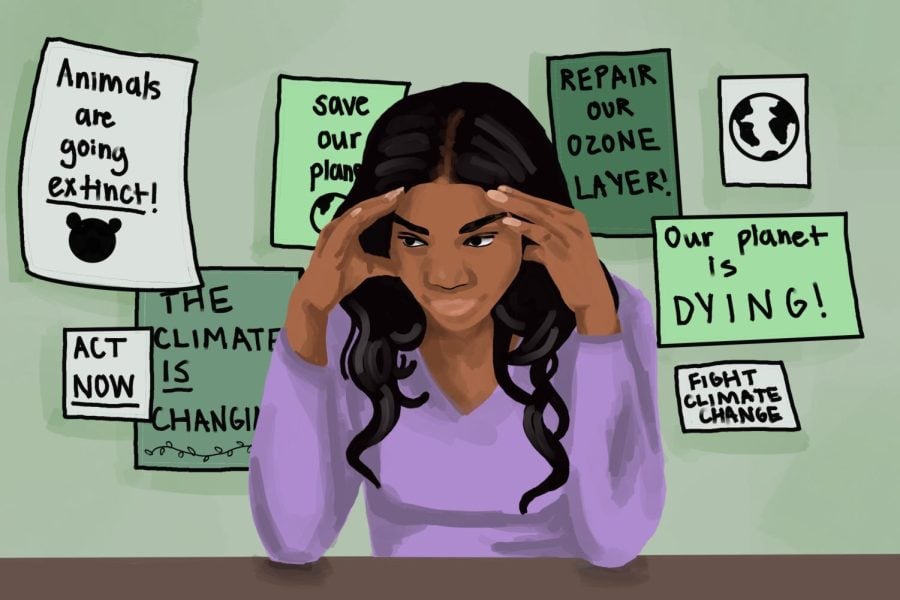“Turn that despair into hopefulness”: Students and experts talk climate anxiety, potential solutions
Students and experts discuss the “hopeless” feeling of climate anxiety and the importance of fostering community and taking action to combat it.
May 15, 2023
When campus environmental activists recently met Weinberg senior Hannah Dembosky, a member of the Associated Student Government Sustainability Committee, said she asked meeting participants what Earth Day meant to them.
While some felt hopeful people still care about the Earth, others were less optimistic. Some fellow activists, she said, find it difficult to keep fighting for action.
“(Activism) can feel like a constant pushing up against something that’s not really moving at all,” she said.
Dembosky said she thinks addressing climate change is “hopeless” and makes her feel a “very existential dread.” She isn’t alone –– a study published in The Lancet in December 2021 found that almost 60% of people between 16 and 25 feel “very” or “extremely” worried about climate change.
Mental health experts coined the term “climate anxiety” to describe the distress some people undergo when thinking about climate change. Medill Prof. Abigail Foerstner said climate anxiety describes worries about the future, climate change’s current progression and fear over the lack of a transformative response.
“All of these situations make you feel very vulnerable,” she said. “This is no longer looking ahead at how will this impact us in the future. We can see it now.”
Explaining the root causes of climate anxiety
Foerstner said the Intergovernmental Panel on Climate Change, the United Nations body that assesses science related to climate change, showed extreme weather caused by climate change is creating irreversible losses.
Her environmental reporting students tell her they feel an existential dread because they feel it’s up to them to address climate change, she added. For others, their anxiety stems from their experiences with climate-related disasters.
“Anyone from the Atlantic coast and the Gulf has seen horrific damage from hurricanes to their own families or to people that they know and care about,” she said. “This creates uncertainty and worry.”
Michele Forjette is a member of the Climate Psychology Alliance North America, which is a network of climate-aware therapists. She said displacement due to climate disasters can also cause anxiety.
“One of the biggest things that’s been coming up with people is that they feel like they’re not heard,” she said. “Sometimes they feel that they’re being told that they’re exaggerating.”
Fostering empathy in solution building
SESP freshman Anusha Kumar said her stress grows when she hears about how the U.S. and other countries are not taking adequate steps to solve climate change.
Marginalized communities experience the effects of climate change earlier and to a greater extent, according to a 2021 U.S. Environmental Protection Agency Report. Kumar said this reality amplifies climate anxiety.
Forjette said she has noticed climate distress surrounding displacement and uncertainty from people with marginalized identities.
“It’s our (climate therapists) responsibility to educate ourselves … and then really listen to the individual and use those skills to help identify their sources of strength,” she said.
Forjette said she sees mental health impacted by climate concerns after disasters and in response to other stressors –– like younger people thinking about how they will cope with change.
Addressing climate anxiety requires validating people’s emotions and helping them process, she said.
“What can be really helpful with that is tapping into their resilience and helping them to stay in the moment,” she said. “They can turn that despair into hopefulness.”
Solutions centered around community building, activism
Forjette said maintaining healthy habits, reducing stress and practicing mindfulness can help mitigate climate anxiety. She highlighted the importance of “eco-empathy,” safe communities in which people can discuss their stress about climate change.
Creating a plan for emergencies is also important for anxiety reduction. Forjette also recommends learning basic response training.
Weinberg sophomore Alexis Schwartz, co-chair of the ASG Sustainability Committee, said her climate anxiety stems from convincing people to care. She feels she is not doing enough for the Earth, but talking with others experiencing similar feelings is helpful.
Last year, Schwartz said the ASG Sustainability Committee partnered with One Book One Northwestern to host climate cafés –– inclusive spaces fostering conversation about climate change.
Schwartz said NU’s sustainability community provides a helpful interconnection for easing climate anxiety.
“We can pull each other out of (those feelings), and that’s why I think the community aspect of sustainability is really important,” she said.
Recently, the ASG Sustainability Committee’s Earth Day GREENOUT event helped promote environmentalism on campus through education and performances. Foerstner also said initiatives like campus gardens and local volunteering help ease students’ fears about a lack of action.
“Students are really picking up that commitment,” she said. “When we feel we’re doing something, and especially when we see our action taking place within our community, I think that relieves anxiety.”
Dembosky said environmental activism has become a “coping mechanism” for her, allowing her to feel like she’s making a difference.
As a member of Fossil Free NU, Kumar also uses advocacy to alleviate her climate anxiety. She is helping fight for the University to divest from fossil fuels.
While she emphasized the importance of understanding climate change is out of an individuals’ hands, there are still things she thinks people can help with.
“Everyone has different capacities, and I think a big thing is meeting people where they are,” she said. “Prioritizing taking care of yourself, and then also if you have the capacity, taking action within your local community is really important.”
Email [email protected]
Twitter: @chiarafkim
Related Stories:
— Evanston Ecology Center Earth Day Celebration brings family engagement, environmental knowledge
— Residents, local activists convene to discuss climate-friendly home improvements


